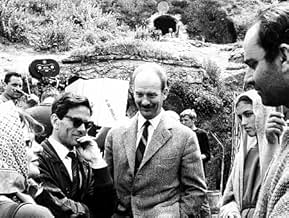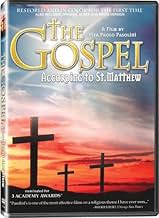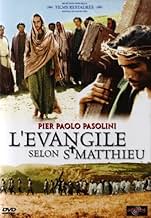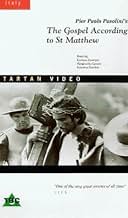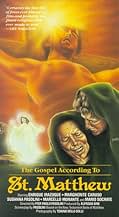The life of Jesus Christ according to the Gospel of Matthew. Film shows Christ as a Marxist avant-la-lettre and therefore uses half of the text of Matthew.The life of Jesus Christ according to the Gospel of Matthew. Film shows Christ as a Marxist avant-la-lettre and therefore uses half of the text of Matthew.The life of Jesus Christ according to the Gospel of Matthew. Film shows Christ as a Marxist avant-la-lettre and therefore uses half of the text of Matthew.
- Director
- Writer
- Stars
- Nominated for 3 Oscars
- 7 wins & 9 nominations total
- Caifa
- (as Rodolfo Wilcock)
- Director
- Writer
- All cast & crew
- Production, box office & more at IMDbPro
Featured reviews
First - it contains perhaps the most powerful piece of MUSIC I ever experienced in a movie. I've never forgotten my utmost impression from that music when I saw the movie for the first time in a film-club some twenty-five years ago. From a total silence of the first titles, a music like an avalanche of a heavenly army hitting the soul ...
Which music it was? MISA LUBA! An incredible polyrithmic blend of three ingredients: a high melodic church chorus of Kenyan women, plus an unbelievably improvising african singer, plus a bunch of African drummers... everything locked together by an unrepeatable moment of inspiration and chance. I could not imagine some most powerful music to underline the most exposed passages of Jesus' story. Curiously and sadly enough, this MISA LUBA is even not credited in the movie titles, in contrast to a fair (but much more standard) classic music used in most of the movie. It was just this happy usage of MISA LUBA which contributes most to the soul and mood of the Pasolini film. It is also well understandable why Pasolini used an eclectic mixture of music from various continents, -- in an obvious intention to make the universal story yet more UNIVERSAL, across the nations and cultures.
Second happy aspect of Pasolini's interpretation is his cast of characters, his choice of believable and interesting types ... for Jesus, for Maria, and most other characters. These are believable and convincing types of people from the middle-east. How superior and fair is here Pasolini in comparison with all those funny blue-eyed and polished Hollywood casts of those pseudo-biblic stories ...
And third - Pasolini did very well to make the movie in black-and-white. It contributes to a mystical, spiritual and abstract atmosphere of the opus. In my opinion, it would be hardly possible to make this movie well in color.
And yes, I agree with those who say that practically all other movies about Jesus and those biblic stories are fundamentally wrong, and in cases of those (in)famous Hollywood versions - even funny to tears.
This Pasolini's opus is very honest and might be the 'very best film interpretation of Jesus' story.
Enrique Irazoqui, who plays Jesus, gives an excellent performance. He brings an intensity and harshness to the role that is very much in accord with the Jesus portrayed in numerous passages of the gospels. Margherita Caruso, who plays Mary as a young women, is an inspired choice. Although she does very little, and I cannot truly commend her for her acting, she has an amazing presence in this film, combining serenity, holiness, and innocence.
Pasolini paces the film well. It never drags, and never passes over subjects or incidents too quickly. The heroic quality of Jesus' life is strongly emphasized, his confrontations with existing religious authorities, his preaching of his message throughout Palestine, his bravery before the Roman authorities, and so on. Through demonstrations of his resolve, composure, and sternness, a real sense of the courage and dynamism of the character of Jesus is produced.
Pasolini's choices of locations could not have been better, and the scenes are staged and filmed skillfully, emphasizing the right emotions at the right times, whether those are feelings of sympathy, courage, or awe. I would not go so far as to say that any of these elements demonstrate brilliance, but they are very well done.
I was impressed with Pasolini's use of the gospels, which provide the bulk of what the character of Jesus actually says. I might note, also, that the harshness of much of the message is left intact. Conservative Christians might find this appealing, in that the director does not sanitize the message. Certainly, the pope enjoyed it. Pasolini received a medal from him. Non-Christians, and more liberal Christians, might find parts of the message to be a little frightening. When some of the harsher elements, especially the religious exclusivism (i.e., only those who believe in Christ have hope) are heard as spoken dialogue, rather than as words printed on a page, their impact is much greater, whether it is more disturbing or more inspiring. The film is a powerful evocation of the life of an important religious figure, and can be enjoyed by both believers and non-believers.
The film does have it's faults, however. The scene in which the "massacre of the innocents" is shown is poorly done. I personally found the depiction of the event to be somewhat comical, which clearly was not Pasolini's intention. The score, which draws on a variety of genres of Christian religious music is, by itself, beautiful. Unfortunately, I felt that it did not complement the film. The juxtaposition of disparate musical traditions with one another, and with the harsh world being visually depicted weakened the effect of both, had either stood on its own. I should say that these are relatively minor complaints. The film as a whole is a moving and impressive work. I do not think that it is as impressive a work as any of Pasolini's "Trilogy of Life" films, but it is a great film nonetheless.
This is such a stately, respectful, yet contemporary (and dare I say, Italian) production, in quiet black and white, it's hard to find fault with it. In some ways, I think it does exactly what it intends. It mixes long shots with close ups. It moves with clarity and sharp (no dissolve) cuts from face to face. It uses African-American gospel and Bach. It depends on solemnity, and it uses actors that have the faces, and demeanors, to be utterly solemn and strong.
All the actors are amateurs. Pasolini was an atheist. The triumph at the end is a matter of record. It's all here.
The question might be (for some) whether it is nevertheless a movie you want to watch. And I say, absolutely. You do have to like, or learn to like, movies that are about quiet ambiance, about passive expressions that say more than intense extroverted acting. The black and white photography, something of a throwback during this early 1960s production, gives it even more of the timeless, almost melancholy depth that keeps it going, owing something to the Dreyer's Joan of Arc, I think.
It's important to know this is not really an interpretation of the gospel, but a reading of it. The filming of course required actors, but it tries to be factually straight forward. That's incredibly hard to pull off without arrogance or religiosity. But Pasolini does it. The down side to this is that it's slow, or even (no sacrilege here), boring. I mean, I read the book.
For me, what makes it terrific is not only how it is filmed (the camera-work and editing) and the faces (all those faces, with the camera still and focused on them), but the sense of reality here. The holiness is removed, but not the sacred seriousness. It makes it seem possible in a very real way. The people, the places, all of it is not historic, not in particular, but the effect, the mood, the force of it all is profound. Even for a non-believer. It's quite something to get swept into.
Did you know
- TriviaPier Paolo Pasolini used non-professional actors and cast local peasants, shopkeepers, factory workers, and truck drivers. For Mary at the time of the Crucifixion, he cast his own mother Susanna Pasolini.
- GoofsWhen they are taking Christ down from the cross, in the distance you can see a car driving around a corner.
- Quotes
[last lines]
Christ: All authority has been given to me in heaven and earth. Go, therefore. And make disciples of all nations, baptizing them in the name of the Father, and of the Son and the Holy Ghost, teaching them to observe everything I have commanded you. And behold. I am with you always even unto the end of the world.
- Alternate versionsThe 2007 DVD release features a colorized, English-dubbed version with a run time of 91 minutes and an Italian-language black and white version running 136 minutes.
- ConnectionsEdited into Histoire(s) du cinéma: Une histoire seule (1989)
- SoundtracksMatthäus Passion (BWV 244)
Written by Johann Sebastian Bach
nr 78: Wir setzen uns mit Tränen nieder
nr 47: Erbarme Dich (musical intro)
- How long is The Gospel According to St. Matthew?Powered by Alexa
Details
- Release date
- Countries of origin
- Language
- Also known as
- El Evangelio según san Mateo
- Filming locations
- Castel Lagopesole, Avigliano, Basilicata, Italy(Sanhedrin trial of Jesus, in castle's courtyard)
- Production companies
- See more company credits at IMDbPro
Box office
- Gross worldwide
- $16,572
- Runtime
- 2h 17m(137 min)
- Color
- Sound mix
- Aspect ratio
- 1.85 : 1


